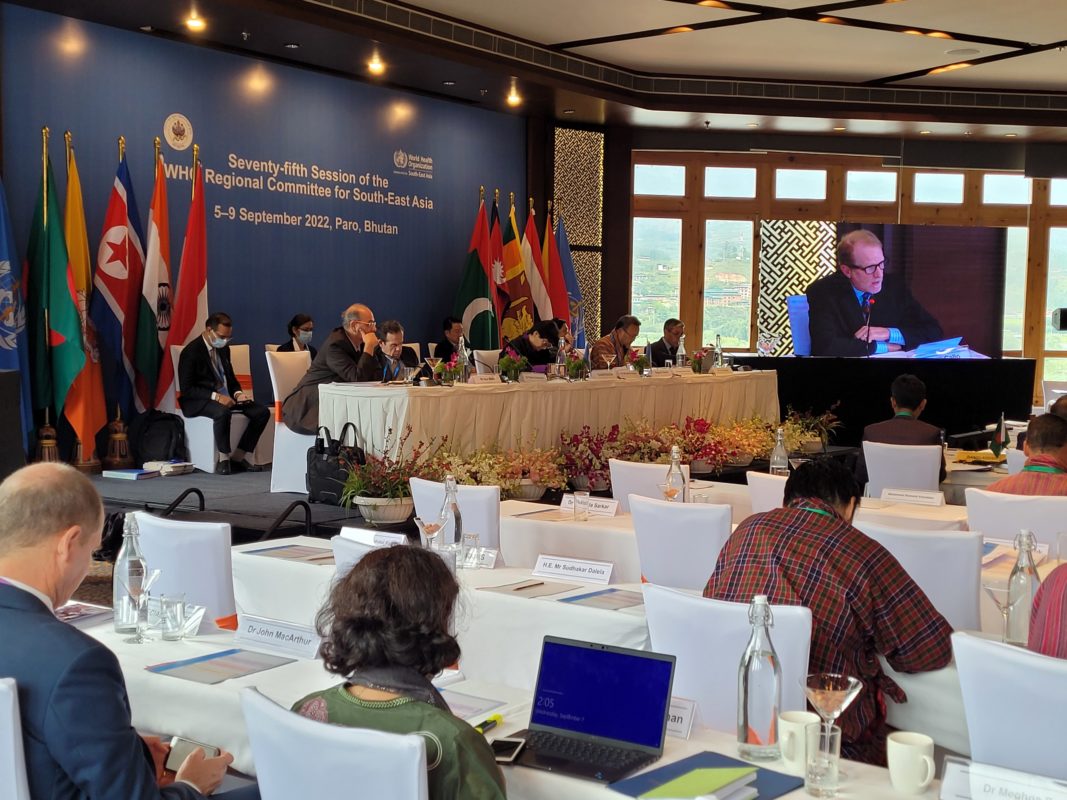8 September 2022 · Task Force for Global Health
Task Force for Global Health Statement at WHO SEARO Regional Committee Meeting
The Secretariat Director of the Global Partnership for Zero Leprosy, Bill Gallo, joined the World Health Organization (WHO) South East Asia Regional Committee Meeting in Paro, Bhutan in September 2022. He spoke on behalf of the Task Force for Global Health, a non-state actor, and advocated for the prioritization of services for leprosy and other neglected tropical diseases. Read his statement below.

Task Force for Global Health Oral Statement at SEARO RCM Session SEA/RC75/10
Annual report on Monitoring Progress on UHC and the Health-related SDGs
My name is Bill Gallo and I represent the Task Force for Global Health and serve as the Secretariat Director for the Global Partnership for Zero Leprosy (GPZL). GPZL is just one of many programs at the Task Force committed to building the systems necessary to protect the health of entire populations as well as eliminate diseases that have plagued humankind for centuries. We recognize that a strong healthcare system with universal access is inherently linked to the success of disease elimination.
We congratulate SEARO Member States and WHO leadership for improving measures toward universal health coverage, but also recognize the need to accelerate progress to reach the 2030 goals, particularly in light of the recent adverse impacts of COVID.
We feel that leprosy and other neglected tropical disease (NTD) programs provide an important indicator of the effectiveness of efforts aimed at universal health coverage as well as the impact that a pandemic can have on those efforts. This is because leprosy and other NTDs are diseases of poverty, often impacting the most underserved, hard-to-reach and impoverished populations. We commend WHO and SEARO Member States for recognizing the need to invest in tracking unserved and underserved populations to inform policy and strengthen service delivery as stated in the 7th annual report on monitoring progress on UHC and health-related sustainable development goals (SDGs).
We realize that the Southeast Asia Region still reports the majority of the world’s new leprosy cases and therefore urge WHO and the SEARO Member States to ensure that UHC goals and objectives not only prioritize services for leprosy and other neglected tropical diseases but that they also consider evaluating UHC effectiveness by its ability to reach those affected by these diseases. These diseases are not included in the health SDGs, but they impact the hardest to reach and most impoverished, and should therefore be considered as key indicators when determining the coverage of and access to comprehensive health services.
These diseases also provide a key indicator of the comprehensiveness of universal health coverage. Fully functioning leprosy and NTD programs include a range of services from prevention, early detection, diagnosis, and treatment, to long-term care and psychosocial support. This aligns with SEARO’s universal health coverage approach that is holistic and people-centered, focusing on physical as well as mental well-being. This is particularly important for leprosy and NTDs that target already marginalized populations who then often suffer from further stigma and exclusion as a result of their disease. We at the Task Force for Global Health also understand the importance of a comprehensive and holistic approach to health services and strive to deliver interventions in a manner reflecting genuine respect and concern for the broader well-being of the people we serve.